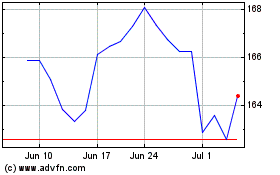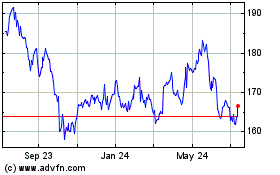Guilt-Free' Products Boost PepsiCo -- WSJ
February 16 2017 - 3:02AM
Dow Jones News
'Guilt-free' foods and drinks account for 45% of net revenue;
global challenges remain
By Jennifer Maloney
PepsiCo Inc.'s push into healthier foods and drinks is helping
lift revenue amid a slowdown in global demand for traditional
soda.
Chief Executive Indra Nooyi said the Purchase, N.Y., maker of
Frito Lay snacks, Gatorade and its namesake cola expects global
economic challenges to continue this year but "we are making
considerable progress" in diversifying the company's portfolio.
Products that the company calls "guilt-free" accounted for 45%
of net revenue in 2016. Those products include diet sodas as well
as snacks with low levels of sodium and saturated fat. The
company's namesake cola accounted for 12% of net revenue in
2016.
In October, PepsiCo revised its goal for revenue generated from
nutritious foods and drinks. It is now aiming for sales growth of
those products to outpace the rest of its portfolio by 2025.
Organic revenue rose 3.7% in the fourth quarter, stripping out
currency fluctuations, acquisitions and an extra week of sales
because of timing. Revenue rose 5% to $19.52 billion.
The company's research and development spending has increased
45% since 2011 and is focused on "sugar, calorie, fat and sodium
reduction and more sustainable packaging alternatives," Ms. Nooyi
said Wednesday during a call with investors.
In 2016, the company launched a reformulated version of 7UP with
30% less sugar, now rolling out in more than 80 markets outside the
U.S., Ms. Nooyi said. ( Dr Pepper Snapple Group Inc. sells 7UP in
the U.S.)
PepsiCo also launched a line of Tropicana fruit juices with
probiotics, and a line of healthy snack bars called Quaker
Breakfast Flats, which will be in more than a dozen countries over
the next two years, Ms. Nooyi said. The company is broadening its
lineup of baked snacks and is expanding Sabra from hummus to a
range of products including guacamole, salsa and Greek yogurt
dips.
PepsiCo's food and snack volumes rose 3% in the fourth quarter.
Its beverage volumes increased 1%, beating rival Coca-Cola Co.,
whose volumes world-wide fell 1% in the same period.
Hugh Johnston, PepsiCo's finance chief, said in an interview
that to drive more growth, "we're going to continue doing what
we've been doing, which is we'll want to innovate, particularly in
the area of lower sugar. We'll continue to invest behind
interesting brands."
Mr. Johnston pointed to the recent launch of LIFEWTR, which this
month was highlighted in Pepsi's first-ever Super Bowl ad devoted
to a bottled-water brand. LIFEWTR is intended to compete with
Coke's fast-growing premium brand, smartwater.
Ms. Nooyi acknowledged "a bit of a hiccup" in 2016 on Diet
Pepsi, which PepsiCo reformulated with sucralose, then reintroduced
with the controversial sweetener aspartame. She said the company
has now shifted its focus from Diet Pepsi to Pepsi Zero Sugar,
which the company featured as the sponsor of this year's Super Bowl
half-time show.
The company saw organic growth of 9% in Latin America despite
the impact of the strong dollar, with a 4% increase in food and
snack volumes offsetting a 3% decline in beverage volumes.
In North America, its Frito-Lay group posted 3% organic growth.
Quaker Foods was flat.
PepsiCo forecasts 2017 earnings per share to be $5.09 with
organic revenue growth of at least 3%.
Write to Jennifer Maloney at jennifer.maloney@wsj.com
(END) Dow Jones Newswires
February 16, 2017 02:47 ET (07:47 GMT)
Copyright (c) 2017 Dow Jones & Company, Inc.
PepsiCo (NASDAQ:PEP)
Historical Stock Chart
From Mar 2024 to Apr 2024

PepsiCo (NASDAQ:PEP)
Historical Stock Chart
From Apr 2023 to Apr 2024
